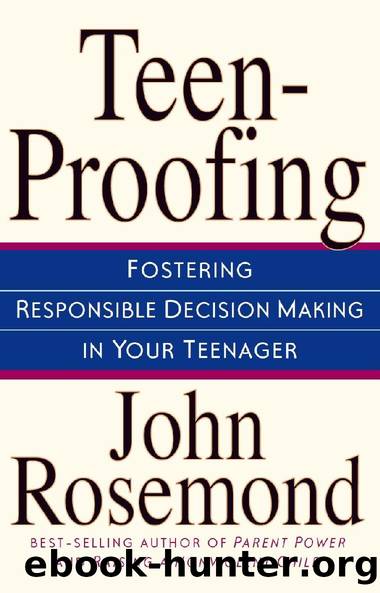Teen-Proofing by John Rosemond

Author:John Rosemond [John Rosemond]
Language: eng
Format: epub
ISBN: 9780740786761
Publisher: Andrews McMeel Publishing
Published: 2001-07-15T00:00:00+00:00
The Long Rope, Redux
The above story of Billy, his parents, and the yellowed paper cylinder is an example of not only a Checkmate Move but also the Long Rope Principle referred to in Chapter Two. Billy’s parents, as you might have guessed, knew all along that Billy was probably smoking pot with his newfound “friends.” They simply chose to sit back and wait for the most opportune moment to do something about it. Something final, as opposed to temporary.
The problem with many parents of teenagers—most, in truth—is that the moment they smell the proverbial “rat,” they go into a killing frenzy. Because they’re panicked and rash, they fail to take careful aim at the problem in question, and the “rat” winds up escaping—wounded perhaps, but still very much alive and, worse, that much more determined.
So, whereas Billy’s parents were very, very concerned about his new friends, his new look, and his new grades, they chose to just observe, waiting for the right moment to act. From an outsider’s perspective, they might have seemed oblivious to Billy’s slow, steady deterioration. Someone who knew the family might have said they were “ignoring the problem.” A mental health professional might have said they were “in denial.” Far from it! They were giving Billy a rope long enough to guarantee he would hang himself.
In a situation of this sort, if a teenager’s parents let their anxieties drive premature action, the teen’s problems will probably abate—temporarily. The youngster, having been alerted to his parents’ knowledge of his self-destructive doings, will take the problem “underground,” making it that much more difficult to do something about in the future. In effect, by acting prematurely, parents almost inevitably do nothing but shoot themselves in their own feet.
Therefore, the “long rope.”
An illustration: Two weeks into Eric’s fifth-grade year (during which he turned eleven, thus qualifying as a “tweenager”—Willie and I received a call from one of his teachers. She told us that Eric was a delightful student in most respects—likable, conversational, inquisitive—but he wasn’t doing his work. He had discovered, it seems, the secrets of peer group popularity and was socializing a lot in class. He wasn’t disruptive, just, well, negligent. Would we please have a serious talk with Eric? she requested.
Willie and I pondered our options, then sat down with Mr. Personality. We told him about the phone call, told him that neglecting his responsibilities was unacceptable, and that he was charged with going to school and clearing up the problem.
“Your report card comes out in seven weeks, Eric,” I said, “and it will tell the story of whether you’ve taken care of this situation or not. To help you take care of it, we’re going to stay completely off your back. During the next seven weeks, we’re not going to ask you any questions at all about school. We’re not going to ask if you have homework, if you’ve finished your homework, if you have any grades you want to share with us, or even whether you had a good day.
Download
This site does not store any files on its server. We only index and link to content provided by other sites. Please contact the content providers to delete copyright contents if any and email us, we'll remove relevant links or contents immediately.
Audition by Ryu Murakami(4099)
The Body: A Guide for Occupants by Bill Bryson(3801)
Adulting by Kelly Williams Brown(3670)
Housekeeping by Marilynne Robinson(3401)
Zero Waste Home by Bea Johnson(3291)
Be in a Treehouse by Pete Nelson(3212)
Seriously... I'm Kidding by Ellen DeGeneres(3100)
Better Homes and Gardens New Cookbook by Better Homes & Gardens(2954)
Barkskins by Annie Proulx(2880)
The Healing Self by Deepak Chopra(2796)
Hedgerow by John Wright(2776)
The Life-Changing Magic Of Tidying Up- The Japanese Art Of Decluttering And Organizing (v5.0) by Marie Kondo(2745)
Spark Joy by Marie Kondo(2677)
The Genius of Japanese Carpentry by Azby Brown(2609)
The Cellar by Natasha Preston(2595)
Work Clean by Dan Charnas(2562)
120 Days of Sodom by Marquis de Sade(2438)
The Book of Numbers by Peter Bentley(2404)
A Monk's Guide to a Clean House and Mind by Shoukei Matsumoto(2404)
